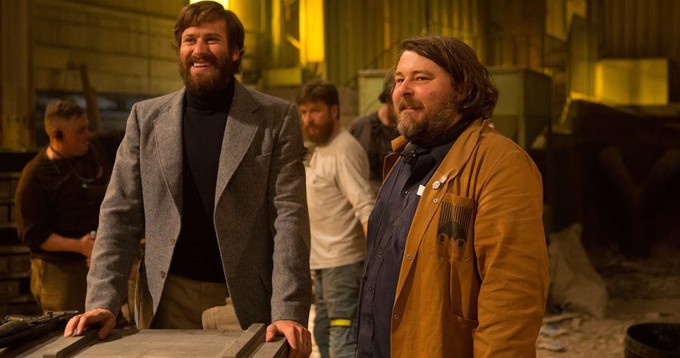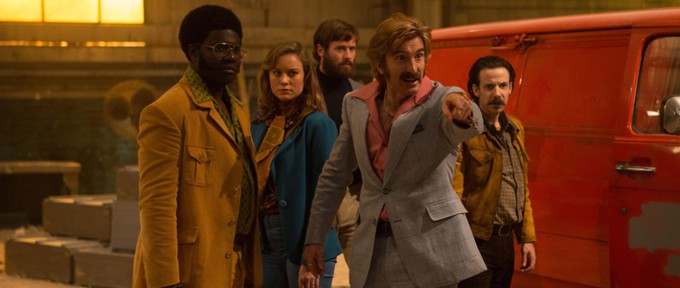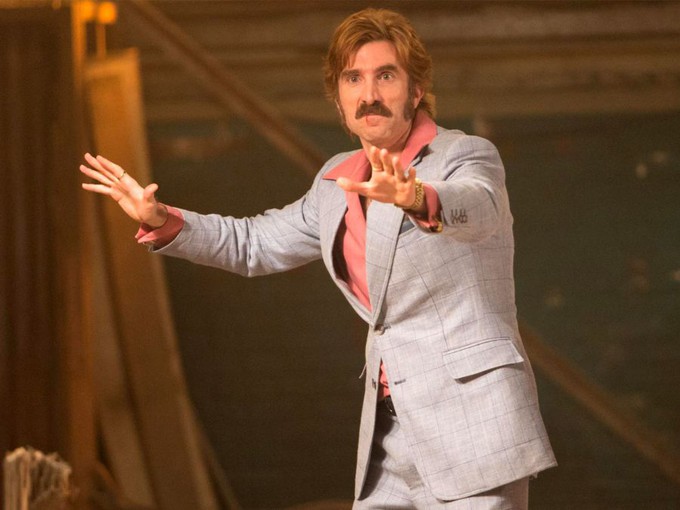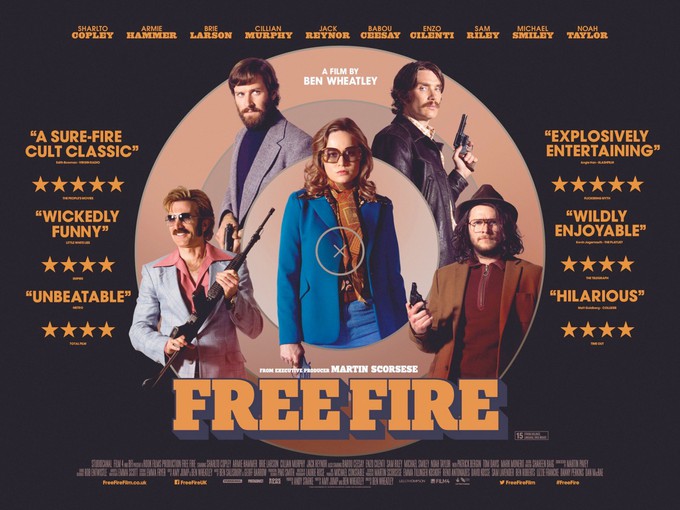Ahoy, squirts! Quint here. Life is weird. Prior to sitting down to this interview I engaged in two paintball battles out in rural Texas countryside. The first was a warm up and my team absolutely slaughtered the opposition. For round 2 we were joined by the three folks from Free Fire: director Ben Wheatley and stars Sharlto Copley and Armie Hammer. Sadly, Hammer had to spectate because he was recovering from some kind of arm injury, but we had madman Copley, in full Vernon character mode, and Wheatley on our team. We couldn't lose!
Until we did. There was some Remember The Alamo shit going on with the other team this time around and within about 30 seconds I felt a little thump on my head. I looked up to my teammate, Britt Hayes, and said, “Did I just get shot?” just as a little stream of green paint trickled down the visor of my mask.
I believe Copley was one of the last men standing on our team, but he was overwhelmed by the sheer numbers left on the other side. I wish I could say we put up a valiant fight, but this time we just completely folded.
It was a hell of a precursor to an interview and one that actually impacted the direction of our chat. You'll see how below.
Free Fire is pretty great. It reminds me of the kind of no shits given kinetic indies of the '90s filled to the brim with great A-listers and characters actors just having fun. In our talk about the movie we cover the dangers of filming a movie with so much gunfire, character economy and, oddly, Smurf handjobs. Yeah, it's that kind of chat.
Enjoy!

Armie Hammer: I talked to you for Social Network!
Quint: I remember being surprised you knew the site.
Armie Hammer: Yeah, you were one of the first (interviews for a) website I actually read!
Quint: Well, thanks for joining my paintball team. Sorry I couldn't be of more help. I got headshotted right away.
Ben Wheatley: I did as well, I just lied about whether or not I'd been hit. (makes a wiping gesture)
Armie Hammer: That's the blood of my enemies!
Sharlto Copley: I surprisingly didn't cheat, even as Vernon, which is unusual.
Armie Hammer: (noting the blue paint on Copley's hand) He did give a Smurf a handjob, though.
Ben Wheatley: (Cackles with laughter) Oh, Poppa! Oh, Poppa Smurf!
Sharlto Copley: I did end up with some welts on my arm.
Quint: But that's in line with the movie, though. Most people in the movie don't go down with a single bullet hit.
Sharlto Copley: It'd be a good thing to see how many people would have actually died in the paintball game because I would still be alive.
Armie Hammer: You wouldn't even know that you were shot until some says “Hey, man, you're bleeding.”
Ben Wheatley: The thing is in a paintball game you know you're not going to die. If you knew you were going to die no one would fire and they'd all be on the ground like “Oh, fucking hell!”
Sharlto Copley: Yeah, everyone's always gung ho when it's not real bullets.
Quint: When I got hit, I got hit right at the top of my helmet, on the head, and I was half-tempted to play Babou Ceesay's character in the movie and just lay down for a bit before getting up and randomly walking around through the fire fight.
Sharlto Copley: I think you could have gotten away with that, by the way.
Ben Wheatley: The only thing that happens when you get shot (in that part of the head) is you can't remember the summer of '87.
Quint: One of the things I love so much about the movie is it shows character through action. There's a little bit of quiet before the storm at the beginning, but it's not all about character exposition. We get most of our information about the characters when the shit hits the fan. I imagine as an actor that's really appealing to see in a script because you know you don't have giant blocks of dialogue to explain who your character is.
Armie Hammer: There's no exposition in this movie.
Ben Wheatley: Yeah, there's no “my memories of South Africa...”
Armie Hammer: It was a really fun, organic way to get a character across, but also because of the collaborative nature of Ben and Amy (Jump) who wrote the script, they both had lived with this for so long and had done so much research and so much preparation and so many mock-ups of the warehouse and how they were going to shoot this, they knew these characters. They knew everybody in the script so much better than any actor who came in to do it.
While we were there, in this safe yet dangerous place that we created, this warehouse full of Tetanus, if you'd say something and it was on brand with the character and was how they envisioned it, then it was great. “Do that again, do another one of those.” But if something was off we had great direction to keep up on brand.
It's great as an actor to never have to worry about “How am I going to say this line and make it sound organic because now I'm talking about my days in South Africa?” We had the opportunity to not tell our characters, just do our characters.

Quint: Maybe you can talk a little about that preparation. Blocking is important in any movie, but with all the gunfire and so many characters to juggle I imagine the blocking on this one had to be so exact and crystal clear.
Ben Wheatley: The first half hour is freer because that's the acting and characterization part of the movie, so I shot that in the way I shot all the other movies, where it's planned out and storyboarded, but I'd put that aside and see what the actors have. But after that it becomes more critical.
We shot it in this way where it'd be quite long takes, like 3-4 minute takes, so it felt loose. It wasn't broken down into tiny little shots like you usually see in an action movie, so it felt more like a news report from a war zone.
Quint: Was that challenging for you guys, as actors, to know you had to be super specific?
Sharlto Copley: Not for me because I'm used to having to be more specific for visual effects. It was actually fantastic. Ben creates a very free environment, a very, very actor friendly environment. I think we all knew that it would be a character film. One thing that was really cool is when you have really good actors everybody is working to be complimentary in their differences, meaning you're not all trying to play the same thing. With the looks, with the dialogue, with the type of characters... we were trying to find ways of complimenting each other.
Quint: I don't know how you pulled it off, but the characters all get to be big without turning into cartoons.
Ben Wheatley: There used to be more stuff out there like this, didn't there?
Quint: Yeah, one of my favorite movies is The Taking of Pelham 123 and each one of the robbers all types and can go big, but they feel grounded. You strike that balance, too. I assume much of that was on the page.
Sharlto Copley: Yeah, but actually in the edit, too, which is quite remarkable. I remember reading it and thinking “Is he going to be able to balance so many characters? Is it going to come down to just 2 or 3 characters and all the others are kinda off in the periphery?” That was definitely something that could happen. That's one of the hardest things to do, is to make a film with this many characters and try to give them all time.
Armie Hammer: Sam Riley is one of my favorite things in the movie. He's so talented and so good in the movie that he's like, metaphorically, “Get the fuck out of my way, this is what I gotta do!”
Ben Wheatley: I found when I did High Rise... there's characters in High Rise that have, like, 2 or 3 lines. I was really worried when I cast them. I was like “Oh, man, is this going to be embarrassing for the actor? You only get 2 or 3 lines...” But then these characters would end up being huge on screen, so I realized that it really isn't about lines, necessarily, it's about how you fuckin' take over the screen.
Armie Hammer: You get a bunch of attention-hungry actors looking for it.
Quint: I don't want to divert too much, but since you brought up High Rise I wanted to compliment you on one specific performance in that movie. I love what you did with Luke Evans in that movie.
Armie Hammer: (applauds) That's one of my favorite performances, by the way.
Quint: I haven't seen someone pull off a real-deal Oliver Reed vibe on screen as much as he did in that movie.
Armie Hammer: Great!
Quint: I've met the dude a few times. I spent a lot of time in New Zealand on The Hobbit and hung out with him a little bit, but I never in a million years would have seen that in him until I saw it in the movie.
Ben Wheatley: I remember when I met him for the first time, and I've only ever seen him in The Hobbit and The Great Train Robbery, the TV thing he did. I was just having breakfast with him and I thought “Oh, you're fucking furious, man.” (laughs) He was really nice and I got on with him, but I could see in his eyes that he could do angry really well.
Armie Hammer: I had a funny conversation with him. We were talking about you (Ben) specifically and he said, “I really kind of feel bad because when we were making High Rise... not that I was in character, necessarily, but it was such an intense thing I was doing all the time I kind of carried that around with me.” Knowing him now as a person and knowing how sweet he is, I'm like oh my God, that must have been terrifying for everyone on set who thought they were going to work with nice, sweet Luke Evans!
Quint: One of the things I've noticed in all the time I've spent on a set that anytime there's even a single gun in play, the set gets really controlled, it gets really serious. You had a lot of guns on this set. One thing I love, actually, is that you introduce this massive payload of automatic weapons that don't ever really get used.
Ben Wheatley: Yeah, the bullets are all locked away somewhere.
Quint: Can you talk a little about the gunplay and bringing the guns on set?
Ben Wheatley: We shot in chronological order, so the first week and a bit was a lot of dialogue stuff. When the first gun came out there was that feeling on set where everybody was like “Ooooo.” Then about two weeks after that...
Armie Hammer: It was the job as usual. “Wait, wait, wait! I don't have a gun in this scene? What're you talking about?”
Ben Wheatley: Firing a blank-firing gun is like holding a firework, isn't it? It's fucking scary. If you've got an automatic it's banging about and throwing bullets all over the place. I don't think anyone ever got fully comfortable with it.
Sharlto Copley: The thing that curveballed me was that I just hadn't pieced together how noisy it would be in the warehouse. It's obvious when you think about it.
Quint: I was going to ask about how your hearing is today...
Armie Hammer: What? (laughs) What?
Sharlto Copley: You're inside the whole time and you're doing 85% of the movie with earplugs in. We'd be doing these long takes where you'd be acting and trying to hear each other. To do a nuanced performance with earplugs in was an unusual challenge.
It's interesting what you say about the firearms and people taking firearms really seriously. I always find, by far, the most dangerous stuff on the set is the practical effects of stuff blowing up.

Quint: The squibs and bullet hits on the walls...
Sharlto Copley: Yeah! Especially if it's a long take and they're going to fire off several of them. There were a couple of situations with me where my face is going past something and once I pass it it's going to blow up behind me in the same take. Sometimes that stuff goes off at the wrong time. They definitely do have problems with that.
I always joke that actors don't have a serious job. We're not coal miners. We're not doing stuff that's difficult or dangerous, but that stuff is actually incredibly dangerous. You're walking past something that is going to blind you if it goes off at the wrong time.
So it does put the people under real pressure. They're so good with the guns nowadays you're not really worried someone's going to put something in there and you're going to die, but the little things that blow up on this table and go into your eye that adds a certain edge to everything.
Quint: You've got to have a lot of trust in the pyro guys.
Ben Wheatley: And there was a lot of pyro, wasn't there?
Sharlto Copley: There was a lot of that and the challenge was there was a lot of long takes, which is great from an acting point of view, but from a stunt point of view that's very worrying. “Will these guys remember which ones are going to hit off in a minute in a half?” And you've got earplugs. When everybody's shooting you can't hear “cut!” sometimes. Are we going? Are we cut?
Ben Wheatley: There was one where we were all set for this 5 minute scene and I called action and they hit the things and everything all blew at once!
Sharlto Copley: Then you gotta go do it again and you're like, “Guys, that's not going to happen when I'm standing next to it, right?”
Armie Hammer: Okay, somebody go fix the walls! Start again!
Quint: That brings up an interesting question. How quick were your turnovers when you constantly had to be resetting squibs and filling in bullet hits and stuff?
Ben Wheatley: We shot with a lot of cameras. There was some single camera stuff, but sometimes there was up to six cameras. You can only really do that in a massive space like that.
Armie Hammer: You were able to get your wides and coverage at the same time, which was great.
Ben Wheatley: It was bonkers. You'd never be able to get that on a normal drama because the cameras would see each other. We had little hidden crash cameras, so we could move those real quick. I was also editing live on set, so I didn't overshoot.
Armie Hammer: Before we blow over that too quickly, I would like to clarify that Ben built a full edit bay on set and would have a direct feed from the camera. That was the first and only time I've ever seen this. He would edit in real time. As the information was coming from the camera it was being edited in real time simultaneously. At the end of the day you'd watch what we've shot all day and he'd go “Oh, we need one shot of a hand grabbing this gun for the geography of this shot...” and you'd go get it and it's done.
Ben Wheatley: It was very efficient.
Quint: So you knew what you were missing before you were sitting in an edit room a couple months later.
Ben Wheatley: That's just a horror to me, that idea. There's no reshoots on a film like this, there's no going back. That's been generally the case on all the films I've done. Efficiency is good because it makes you freer. You can make the budget work harder.

Told you it was a fun chat! Hope you guys dug it. If Free Fire is playing in your neck of the woods this weekend, do us all a favor and shell out a few bucks for it. We need more movies like this! The flick is out this weekend.
-Eric Vespe
”Quint”
quint@aintitcool.com
Follow Me On Twitter

